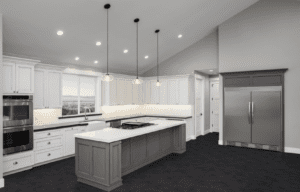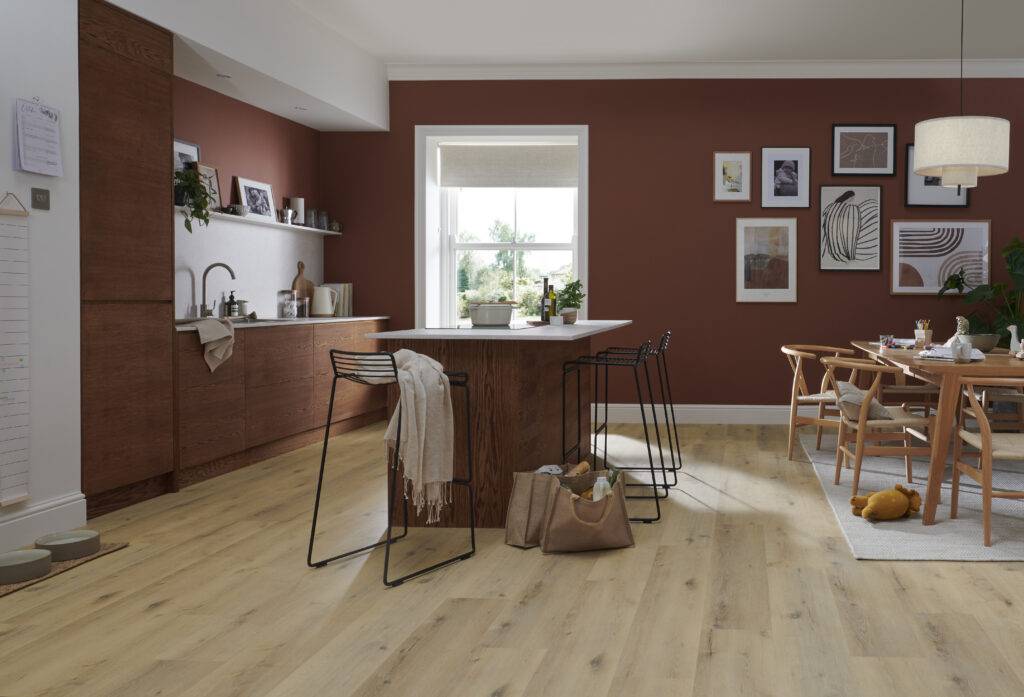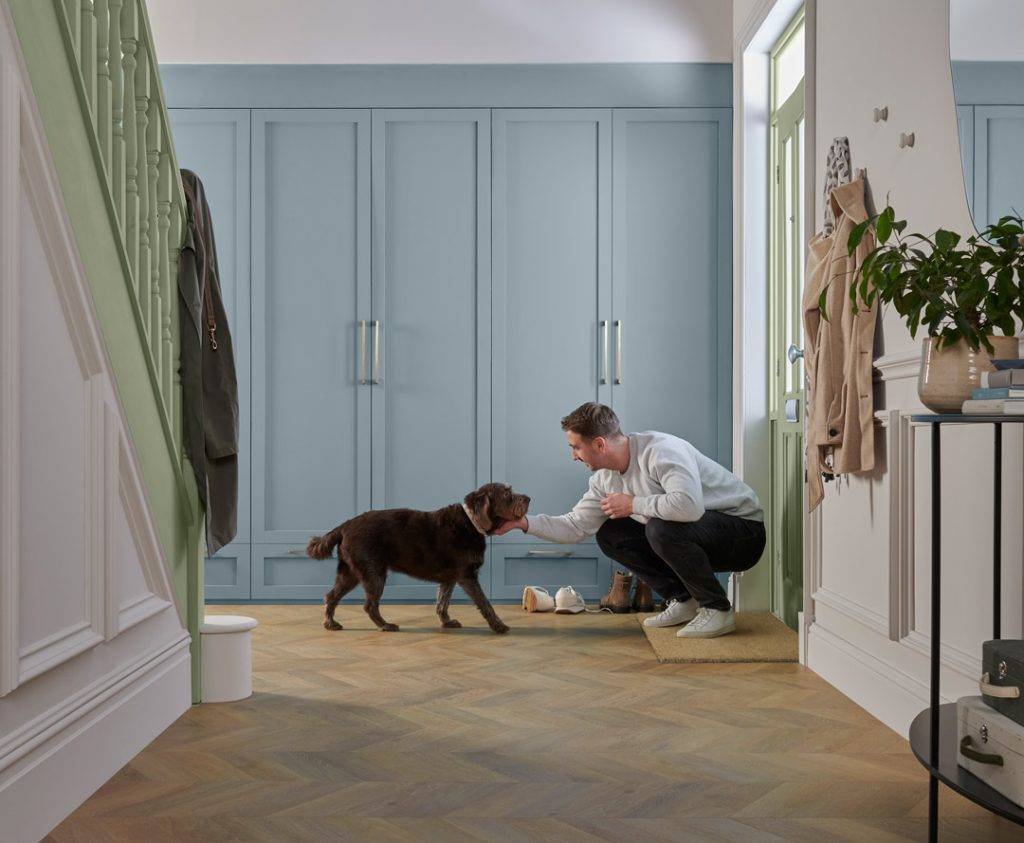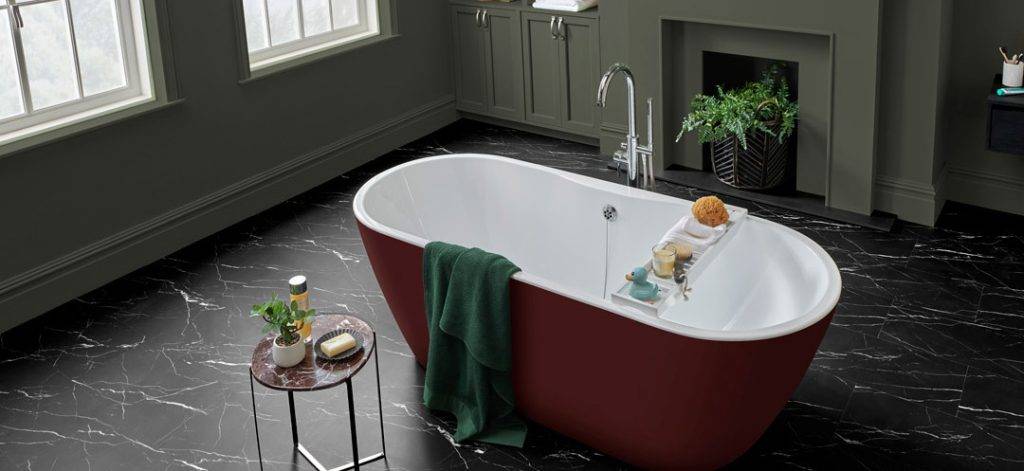Building homes from the floor up
Up to 3 FREE Samples
Because vinyl flooring is mostly made of PVC, it is waterproof and ideal for bathrooms and kitchens. However, the quality of installation can impact resistance to water. LVT, for example, is available in tiles or planks that sit side by side, resulting in many seams. While the tiles and planks are indeed waterproof, if they have been installed incorrectly, water or moisture may enter through the seams.
Vinyl flooring is made up of numerous sheets of various materials that are sandwiched together to make a practical, highly durable, and cost-effective floor covering.
Luxury Vinyl Tiles are a form of vinyl flooring that is intended to look like traditional floor coverings such as ceramic tile and hardwood. Vinyl floors appear and feel practically identical to the things they’re imitating, thanks to technology breakthroughs and improved design capabilities.
LVT is available in two options, flexible glue down or stiffer free-floating click together planks and tiles. LVT’s modular format creates a floor covering that is relatively simple to fit, a significant benefit when remodelling a room or home.
Indeed, with LVT, there is no need to disrupt the daily routine for an extended period of time by blocking off one or more rooms as many LVT renovations can be completed while the furniture remains in the room.
Vinyl flooring is usually regarded as being a highly strong and durable material. However, there are several crucial aspects that impact how long your floor will survive. How it was manufactured, the quality of the material used, and how well it was fitted, for example, will all have an impact on both the life expectancy and durability of your vinyl flooring.
All vinyl floors have a specific surface treatment that gives extraordinary protection and makes them even more durable and resistant to scratches and stains.
They also have a translucent wear layer, which adds durability. Stiff LVT also features a more rigid core design, which provides additional resistance and great dimensional stability.
The product will maintain its shape and size in the face of moisture or temperature changes (within tested tolerances). Rigid LVT’s appearance will not be affected by water, whether hot or cold. In fact, its top layer is so tough that it protects it from all kinds of damage. It’s also an excellent flooring choice for high-traffic areas and anyone searching for a high-quality but low-maintenance floor.
Vinyl floors have a lifespan of anywhere between 5 and 25 years, depending on their quality and how they are laid and maintained. Regular cleaning and maintenance of your vinyl flooring will prolong its shelf life and it could last in excess of 25 years, depending on the quality of the vinyl flooring that you opt for. Luvanto Endure Pro, for example, has a lifetime domestic warranty.

The advantages and disadvantages of vinyl flooring vary greatly depending on the type and quality of product you select. Vinyl flooring has numerous well-known benefits.
It’s soft and silent underfoot, resistant to damage and dampness, simple to install and maintain, inexpensive, and available in a wide range of colours and designs. As a result, vinyl flooring is a popular choice among a wide range of consumers, particularly the design-conscious and budget-conscious DIY consumer.
There are many benefits of vinyl flooring, which is why this type of flooring is currently soaring in popularity. Let’s take a look at some of the benefits of LVT flooring.
Whilst there are many advantages of vinyl flooring, there are also some disadvantages that you should be aware of before making your decision. Here are some of the downsides of LVT flooring.
Recently Viewed
Related Articles
Taskers of Accrington 3,000m² Luvanto Flooring
Looking for a Home Refresh? How to Design a Room Around Your LVT Flooring
From Ordering a Sample to Installation: Your Complete Guide to Choosing LVT the Luvanto Way
The Luvanto Difference: What Makes Our LVT Flooring Stand Out
The Ultimate LVT for Kitchens: Why Black Marble & Oyster Marble are the Perfect Choice
LVT vs. Real Wood/Stone: A Practical Comparison Featuring Our New Products
Clay Earth
Midnight Olive
Coastal Cottage




Trends come and go but a Luvanto floor is forever.
Keep your interiors looking show-home worthy with our colour and trend inspiration. As experts in colour forecasting and pairings, we match the latest trends and colours with each of our flooring shades so you can stay tickled pink with your décor all year round.
Flooring
Inspiration
Where To Buy
Help And Support
Copyright © 2026 Luvanto - QA Flooring Solutions Ltd. All Rights Reserved.
QA Flooring Solutions Ltd is a company registered in England
Registered Office: Unit 2 Hurricane Drive, Speke, Liverpool, L24 8RL
Company Registration Number: 07870268 | VAT Number: 852026449
| Cookie | Duration | Description |
|---|---|---|
| cookielawinfo-checkbox-analytics | 11 months | This cookie is set by GDPR Cookie Consent plugin. The cookie is used to store the user consent for the cookies in the category "Analytics". |
| cookielawinfo-checkbox-functional | 11 months | The cookie is set by GDPR cookie consent to record the user consent for the cookies in the category "Functional". |
| cookielawinfo-checkbox-necessary | 11 months | This cookie is set by GDPR Cookie Consent plugin. The cookies is used to store the user consent for the cookies in the category "Necessary". |
| cookielawinfo-checkbox-others | 11 months | This cookie is set by GDPR Cookie Consent plugin. The cookie is used to store the user consent for the cookies in the category "Other. |
| cookielawinfo-checkbox-performance | 11 months | This cookie is set by GDPR Cookie Consent plugin. The cookie is used to store the user consent for the cookies in the category "Performance". |
| viewed_cookie_policy | 11 months | The cookie is set by the GDPR Cookie Consent plugin and is used to store whether or not user has consented to the use of cookies. It does not store any personal data. |
Building homes from the floor up
Up to 3 FREE Samples